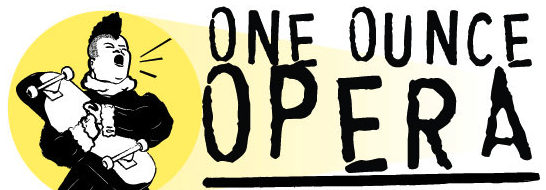 One Ounce Opera is happy to introduce you to Tony Solitro, composer/librettist of “She’s Fabulous,” a Fresh Squeezed Ounce of Opera 2018 winner. Soprano Julia Watkins-Davis (Clarice) and Mezzo-soprano Patricia Combs (Bethel) — who will breathe life (and laughter!) into the piece — had these questions for Tony:
One Ounce Opera is happy to introduce you to Tony Solitro, composer/librettist of “She’s Fabulous,” a Fresh Squeezed Ounce of Opera 2018 winner. Soprano Julia Watkins-Davis (Clarice) and Mezzo-soprano Patricia Combs (Bethel) — who will breathe life (and laughter!) into the piece — had these questions for Tony:
1. I really enjoy singing this piece. I understand that part of the inspiration may have come from a Funny or Die video. Could you walk us through your composition process for this piece? How did you come up with the character names?
The idea to adapt Jack Neary’s play came from Greg Smucker and Trish Weinmann (Artistic Directors of Boston Opera Collaborative). They sent several short plays and asked if any resonated with me. When I read the script, Clarice and Bethel seemed so familiar to me. I adore all the over-the-top opera singers in my life, even when they are being total divas. I poke fun at singer-culture throughout the vignette, but it always comes from a place of love.
The original play is sharp and concise. When the ladies banter and echo one another, it’s also quite musical. I seized every opportunity that allowed the characters to sing together. (I’m always on the lookout for these moments, but they are rare in plays). These qualities are all built into the source material, so the process felt very organic.
2. Do you compose at the piano? Or do you use Digital Performer, Logic, or ProTools to sequence the music, or go old-school with manuscript paper and then to Sibelius or Finale to render it?
I composed most of She’s Fabulous at the piano and penciled it on old-school manuscript paper. I wrote it during a residency at VCCA in Virginia. My studio had a lovely grand piano—a luxurious step up from my trusty keyboard at home—and wanted to take full advantage of it. (I don’t work this way on every piece. I often prefer to balance my work at the piano with abstract techniques. Drawing shapes and contours. Mapping out rhythmic and harmonic patterns. Writing prose.) Each evening, I engraved the day’s work in Finale.
I surprised myself with this piece. The concept was clear to me from the moment I read the play. The muse took over, and the realization felt inevitable. I typically trudge through several sketches and drafts. I refine ideas through a slow, methodical, and labor-intensive revision process. The final score for She’s Fabulous materialized with uncharacteristic immediacy and clarity. This is me at my least self-conscious. I remember worrying about the pastiche audition arias and the zany “Congratulations†waltz. Comedy is particularly challenging … I’d work alone all day, then step out of my studio humming the tunes and chuckling to myself. I wasn’t sure if anybody else would find it funny. When I heard the audience’s reaction opening night, I was glad I didn’t second-guess my choices.
3. I noticed that, for the most part, this piece was written very conversationally. How long did it take you to get the rhythms just right?
There’s an ideal balance that I want to achieve. If it is too conversational, the whole thing sounds like recitative. The voice can’t shine in that context, and it’ll be boring for the audience. If I sacrifice prosody for the sake of the music, then I’m disrespecting the text. It weakens the theatrical experience if the words are unintelligible.
John Steinbeck gave some wise advice. “If you are using dialogue—say it aloud as you write it. Only then will it have the sound of speech.†Even though I’m not a vocalist, I sing through everything with a metronome. (Gotta make sure I can get the words out at tempo and find my note in the chord!) From the beginning, I make it a priority to honor natural speech patterns. Then, I can make music. Stretch things out. Energize the rhythmic profile. Play with articulation.
4. I was wondering if you were interested in composing more “mini-operas†with Clarice and Bethel, since Jack Neary has at least six ten-minute plays…
I have a lot of fun with the mini-opera genre. It’s been a satisfying creative outlet for me. Boston Opera Collaborative presents a popular “Opera Bites†program each November. Our first collaboration was She’s Fabulous in 2016. They subsequently commissioned Triangle in 2017, and we have an exciting project in the works for 2018. I am certain more vignettes are in my future—but I have no plans (yet) to adapt another from the Clarice/Bethel series. Should the opportunity present itself, I’d happily revisit them. Jack’s writing is brilliant, and these characters hold a special place in my heart.
Watch an One Ounce Opera live performance of She’s Fabulous on YouTube!
_____

Tony Solitro is composer of concert and stage music whose recent works have been commissioned by Boston Opera Collaborative, Joseph Conyers (Assistant Principal Bass, Philadelphia Orchestra), the Institute of Contemporary Art, Philadelphia, and Network for New Music. His compositions have been performed by People Inside Electronics (Los Angeles), the Litha Symphony Orchestra (Manhattan), International Opera Theater (USA/Italy), and in venues such as the Red Note New Music Festival (Illinois State University), the Royal Northern College of Music (Manchester, England), and the International Guitar Research Centre (University of Surrey, Guildford, UK). Tony has been awarded fellowships from Yaddo, VCCA, Brush Creek, Kimmel Harding Nelson, and the Brevard Music Center. He earned his Ph.D. (University of Pennsylvania) as a recipient of the George Crumb Music Fellowship and his M.M. (Longy School of Music) on a Nadia and Lili Boulanger Scholarship. To hear recordings, see videos, and explore his composition catalogue, visit www.tonysolitro.com.

Julia Watkins-Davis has been praised for her”fiery coloratura” and”outstanding musicianship and gift of interpretation” as a classical performer. In the 2017-2018 Season, she will perform Donna Anna in Don Giovanni with Texas Concert Opera Collective, and debut in a winning mini-opera with One Ounce Opera’s “Fresh Squeezed Ounce of Opera.” Credits include work with Austin Opera; Los Angeles Opera and their Community Education Department; Glimmerglass Opera; the Geffen Playhouse in Los Angeles; South Bay Opera; Orange County Opera; Pacific Music Festival in Sapporo, Japan; and the Altenburg Musik Festival in Germany. Not confined to traditional classical endeavors, Julia has recorded with emerging popular artists, voiced regional commercials and performed featured solos for film and television soundtracks, including HBO’s Carnivà le and Virtual Obsession for ABC/Von Zerneck-Sertner Films. For the title theme to The Forgotten City, she served as both singer and co-composer. Julia Watkins-Davis was awarded the Grand Prize at the national finals of the Bel Canto Vocal Scholarship Foundation. She has also been honored as a district winner of the Metropolitan Opera National Council Auditions in Southern California, recognized by the National Association of Teachers of Singing (NATS), the Young Musicians Foundation, the Palm Springs Opera Guild, the Loren L. Zachary Society and the Opera Buffs of Southern California.

Patricia Combs, mezzo soprano, loves singing a wide variety of music, but excels in French literature, zarzuelas, and loves the challenges of contemporary works as well as chamber music. She will be playing the role of Dame Hannah in Ruddigore this summer with the Gilbert & Sullivan Society of Austin. Her roles include Alisa in Lucia di Lammermoor, Bianca in The Rape of Lucretia, Meg Page in Falstaff, Mrs. Zilkov in The Manchurian Candidate and Dinah in Trouble in Tahiti. She studied with Dr. Hugh Cardon, Rose Taylor, Cindy Sadler, and Cynthia Moellenhoff. She holds a Bachelors of Music Education from UT-El Paso and a Masters in Vocal Performance from UT-Austin.

